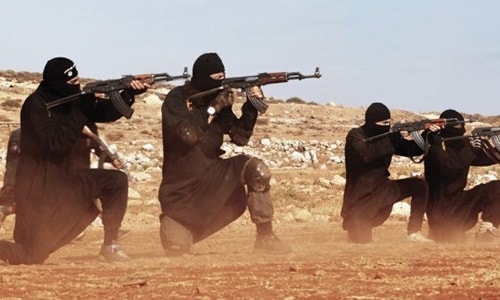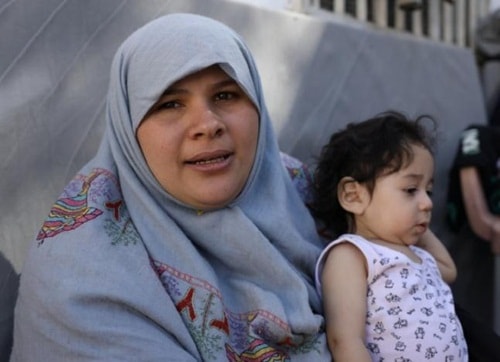IS internal strife, suspicion of each other when pushed into a corner
IS leaders fear a revolt within the organization.
 |
Islamic State (IS) militants in a propaganda video released by the group. Photo: BBC. |
Desperately cornered in its Syrian stronghold of Raqqa, the Islamic State (IS) appears to be turning its suspicions on one another, Reuters reported, citing three Tunisian wives of IS fighters who recently escaped from Raqqa. IS is actively mobilizing spies to search its ranks because it suspects enemies have infiltrated the organization.
According to the three women, IS leaders tried to flee Raqqa under increasing pressure from attacks by US-backed forces or Syrian government troops. One said ordinary fighters, who had no position in the organization, were left behind to die for their commanders.
Khadouja al-Humri, one of three women who escaped Raqqa about six months ago, said she and her husband fled south to the town of al-Mayadeen, another IS-held area, and hid there.
Al-Humri’s husband stole cars from IS commanders and sold them to raise money to hire smugglers to take them across the Euphrates River to areas controlled by the Kurdish People’s Protection Units (YPG). When they arrived, the YPG detained her husband. Al-Humri was questioned but not arrested.
Fear of being overthrown
Al-Humri said IS leaders were extremely worried about being toppled by an uprising and that Tunisian fighters were seen as a threat because they had frequently criticized the way IS operated. Her account clearly showed that there had been internal dissension within IS and that it had grown in recent months.
"My husband is very scared. There are about 70 Tunisians wanted by IS. They want to shoot them," al-Humri told Reuters in an interview at a refugee camp in Ain Issa, a village north of Raqqa. "You can't speak freely or condemn IS, you don't know who is listening."
Three women, two from Tunisia and one from Lebanon, said they joined IS hoping to live the religious life they had long dreamed of. However, things did not go as they expected.
According to al-Humri, some Tunisian fighters believe that the extreme measures taken by IS leaders in Raqqa are apostasy. In addition, the obvious inequality between leaders and fighters further divides IS.
 |
Khadouja al-Humri. Photo: Reuters. |
IS has recently continuously posted videos showing them executing people believed to be spies or agents planted by "foreign enemies" into the organization.
According to sources familiar with the matter, IS supreme leader Abu Bakr al-Baghdadi is currently not present in Raqqa or Mosul, the two largest strongholds the group occupies in Syria and Iraq. He lives in hiding, trying to hide his identity.
One of al-Baghdadi's biggest worries is that his subordinates and confidants might betray him for the $25 million reward that the US government has offered for anyone who helps bring him "to justice".
The US-led coalition against IS estimates that between 3,000 and 4,000 IS fighters remain in Raqqa, even after its leaders left for safer locations. US intelligence officials speculate that IS leaders have reorganized their operations in Raqqa.al-Mayadeen, southeastern Syria.
According to VNE
| RELATED NEWS |
|---|


